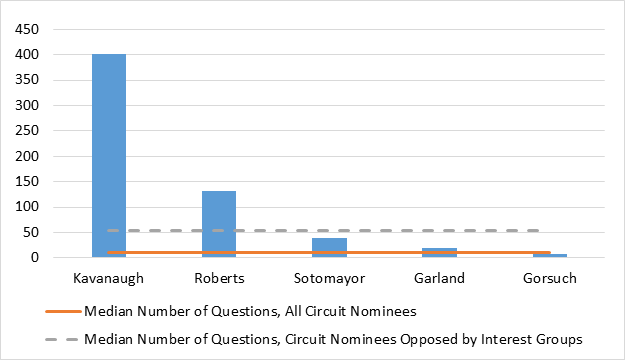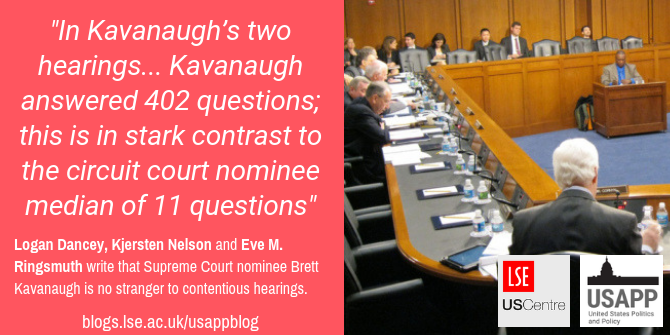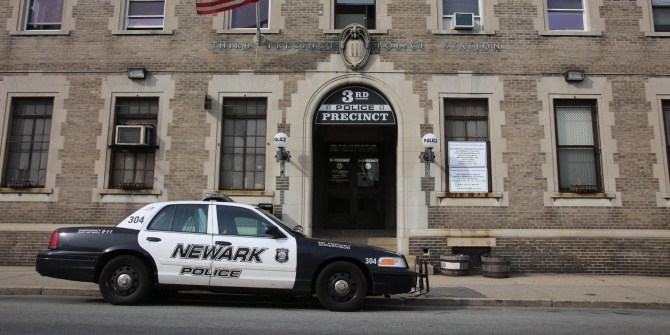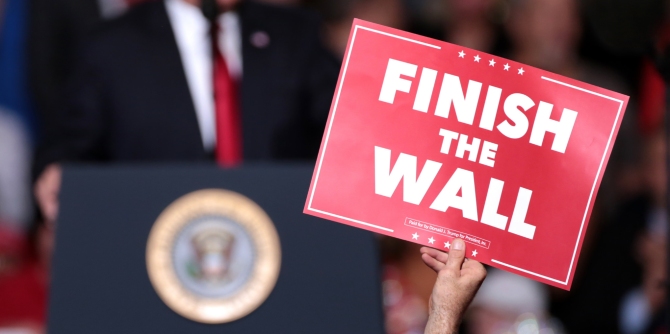

 This week, the US Senate Judiciary Committee will begin hearings to confirm D.C. Circuit Court Judge Brett Kavanaugh for Justice Anthony Kennedy’s seat on the Supreme Court. While there has been much media speculation as to how these hearings might play out, Logan Dancey, Kjersten Nelson and Eve M. Ringsmuth have analyzed Kavanaugh’s previous confirmation hearings to provide their own insights. They find that Kavanaugh was asked almost 40 times the median number of questions asked of other nominees – questions that were often far more intensive and in-depth.
This week, the US Senate Judiciary Committee will begin hearings to confirm D.C. Circuit Court Judge Brett Kavanaugh for Justice Anthony Kennedy’s seat on the Supreme Court. While there has been much media speculation as to how these hearings might play out, Logan Dancey, Kjersten Nelson and Eve M. Ringsmuth have analyzed Kavanaugh’s previous confirmation hearings to provide their own insights. They find that Kavanaugh was asked almost 40 times the median number of questions asked of other nominees – questions that were often far more intensive and in-depth.
After 31 years of service, Justice Anthony Kennedy announced his retirement from the United States Supreme Court at the end of June. President Trump moved quickly and, on July 9, announced that his pick to replace him was D.C. Circuit Court Judge Brett Kavanaugh. As Washington gears up for Kavanaugh’s Supreme Court confirmation hearing, the usual discussion has begun about what we might expect from the event. To get a sense of what senators might ask Kavanaugh during the hearing, media outlets have looked to his past decisions, speeches, and also his previous encounters with the Senate Judiciary Committee during his confirmation hearings for his current position as a judge on the D.C. Circuit.
In our own research, we have coded all district and circuit court confirmation hearings from 1993 to 2012. We can therefore compare Kavanaugh’s last set of hearings to other Supreme Court nominees who were previously circuit court nominees—and all circuit court nominees more generally. In doing so, it is evident that Kavanaugh’s previous hearings were particularly contentious for a circuit court nominee. In fact, by some measures, his hearings involved arguably the most intense scrutiny of any nominee during the Clinton, Bush, and Obama years.
First, in terms of sheer scrutiny, Kavanaugh fielded a lot more questions. Figure 1 shows that, in Kavanaugh’s two hearings (the second of which is a rare event—typically circuit nominees receive a single hearing), Kavanaugh answered 402 questions; this is in stark contrast to the circuit court nominee median of 11 questions. However, there are aspects of Kavanaugh and his prior nomination that would already make us expect him to field more questions—he was opposed by interest groups, a factor that is correlated with increased contentiousness, and he was nominated to the DC Circuit, which tends to have lower rates of confirmation. Even taking these factors into account, Kavanaugh is an outlier—the median opposed circuit court nominee fielded 54 questions during this time span, and the median DC Circuit nominee fielded 8 questions.
Figure 1 – Number of questions across previous hearings by judicial nominee

Similar to Kavanaugh, Chief Justice John Roberts previously came before the Senate Judiciary Committee as a nominee to the DC Circuit and was also opposed by interest groups. While Roberts fielded the second highest number of questions of the group of eventual Supreme Court nominees, his 132 questions pale in comparison to Kavanaugh’s 402. Senators’ scrutiny of Kavanaugh was significantly greater despite the fact that both nominees’ hearings occurred under similar political circumstances (i.e., the Senate was majority Republican when he was nominated by a Republican president).
Turning to the content of Kavanaugh’s hearing, like other controversial nominees, his questions dive into the specifics of his background and experience. Kavanaugh faced intense scrutiny about his time as a staffer in the George W. Bush White House; these questions tended to ask about whether his previous work in a political position would influence his decision-making and about his role in the White House’s judicial selection process. The hearings also included more typical questions—four senators invoked Roe v. Wade at his hearings, which is in line with other controversial circuit court nominees. Once again, however, even in comparing him to Roberts, who also served in the executive branch during a Republican administration, senators’ questioning of Kavanaugh was significantly more extensive.
Finally, Kavanaugh is notably different in terms of the breadth of senators who participated in his circuit hearings—in other words, his intense scrutiny did not come from a select few senators. Given the high volume of lower court confirmation hearings (as compared to the rare but salient Supreme Court confirmation hearings), senators cannot attend them all; the median number of senators attending circuit court hearings is 2. In contrast, nine senators attended Kavanaugh’s first hearing, while 13 attended his second. Roberts, again, experienced similar, though somewhat lesser interest (8 senators and 5 senators in attendance at his first and second hearing respectively). The other three eventual Supreme Court nominees – Gorsuch, Garland, and Sotomayor – faced, on average, 2.3 senators.

“Senate Judiciary Committee Hearing” by Talk Radio News Service is licensed under CC BY NC SA 2.0
Does this suggest that Kavanaugh’s Supreme Court confirmation hearing will be unlike others before it? Two key pieces of evidence suggest that this nomination is not business as usual. First, the uniqueness of Kavanaugh’s circuit court hearings suggests that senators were previously compelled to engage with his nomination in atypical ways. This is notable in a context where most members of the Judiciary Committee do not attend most hearings. Thus, from the beginning of his federal judicial career, Judge Kavanaugh has faced intense scrutiny from senators on the Judiciary Committee.
Second, there is an institutional uniqueness to this nomination. The seat Kavanaugh would fill on the Supreme Court was previously held by Justice Anthony Kennedy—a justice widely considered to be the swing vote in many 5-4 decisions. As many commentators have discussed, Kavanaugh’s record as a conservative jurist strongly suggests that his replacement of Kennedy will shift the Court in a more conservative direction on key issues. Therefore, this particular vacancy on the Supreme Court is institutionally unique given its potential to reshape important areas of the law and public policy.
Will Judge Kavanaugh’s Supreme Court confirmation hearings reflect his status as a unique nominee in this unique institutional situation? It is doubtful that this will be reflected in the size of the Supreme Court hearing – contemporary Supreme Court confirmation hearings routinely involve approximately 700 questions, which allow senators plenty of room to engage in substantive and intensive vetting of nominees. The spectacle of the Supreme Court hearing has possibly reached the capacity of what these proceedings can contain.
Might his uniqueness influence the content of his Supreme Court confirmation hearing? Given the pre-hearing coverage and other hearings, we would expect the usual emphasis on civil rights issues, including abortion; and, perhaps, even a re-examination of his background and past experience from his first hearings. In terms of types of questions, neither of these would be unusual.
It is possible that Kavanaugh’s history of controversy might be leveraged as a talking point in and of itself. It is also possible that the previous controversy over his circuit court nomination has uniquely prepared him for the Supreme Court confirmation hearing he is about to face. Kavanaugh’s circuit court hearings involved levels of questioning typically reserved for Supreme Court hearings. The difference this time is that more people will be tuning in to this rare political event, which will highlight competing views on key issues, Supreme Court justices, and the role of the Supreme Court more generally.
Please read our comments policy before commenting
Note: This article gives the views of the author, and not the position of USAPP– American Politics and Policy, nor of the London School of Economics.
Shortened URL for this post: http://bit.ly/2wCN0az
About the authors
 Logan Dancey – Wesleyan University
Logan Dancey – Wesleyan University
Logan Dancey is an Assistant Professor of Government at Wesleyan University. His work primarily focuses on the United States Congress and public opinion.
 Kjersten R. Nelson – North Dakota State University
Kjersten R. Nelson – North Dakota State University
Kjersten R. Nelson is an Associate Professor of Political Science at North Dakota State University. She focuses on the U.S. courts and gender and politics.
 Eve M. Ringsmuth – Oklahoma State University
Eve M. Ringsmuth – Oklahoma State University
Eve M. Ringsmuth is an Associate Professor of Political Science at Oklahoma State University. Her research focuses on the U.S. Supreme Court and the separation of powers.






